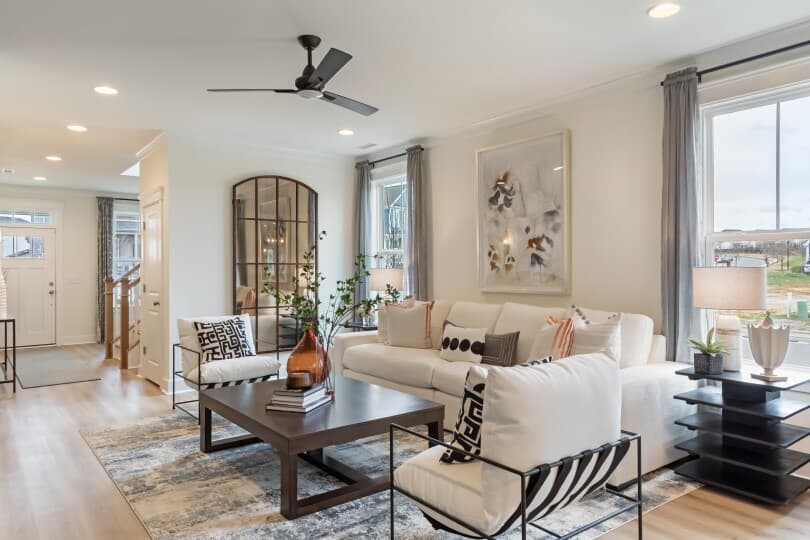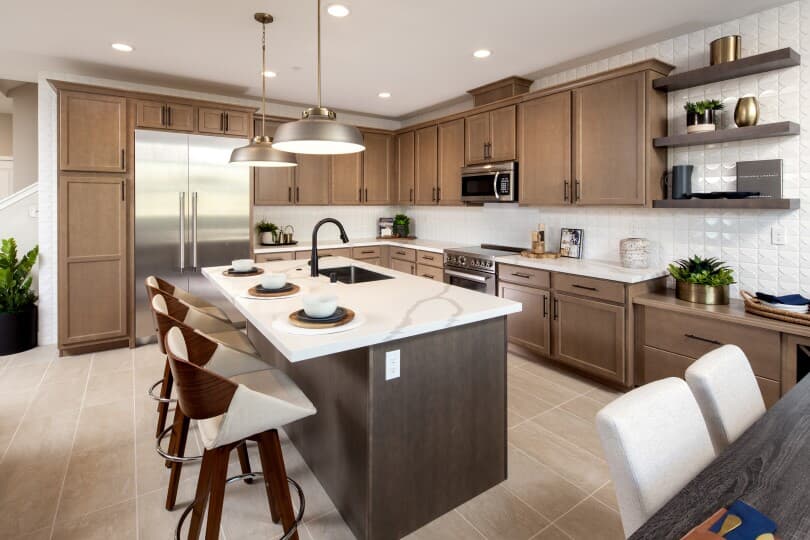Should You Buy a House with a Friend?

Yet, in today’s rapidly evolving housing market, a growing trend is redefining the concept of homeownership: more people are choosing to buy homes with friends rather than traditional partners.
Homeownership can feel like a distant dream, especially when you’re tackling it solo. Buying a house with a friend (or friends) blends financial practicality with social benefits, making it an increasingly attractive option for many, particularly among younger generations. This arrangement can work, but only if you and the other person are candid and honest about your expectations.
Whether driven by financial benefits or the desire for a supportive community, co-owning a home with friends is reshaping the way we think about living arrangements.
Let’s explore the pros, cons, and key considerations of this unique approach to homeownership.

Declan Floor Plan, Single Family Homes Collection, Wendell Falls Community, Wendell, North Carolina
Pros of Buying a House with a Friend
Enter the housing market sooner
If home prices in your area are attainable, entering the market now could be more cost-effective than waiting a few years. By purchasing a home with a friend, you can secure a property, live together for several years, and benefit from potential property appreciation. When the time is right, you can sell the home and split the equity, giving both of you a financial boost.
Enjoy the benefits of homeownership
Owning a home offers several financial perks, including the ability to write off mortgage interest, property taxes, and other eligible home expenses, effectively lowering your taxable income. As you both contribute to the mortgage payments, you’re also building equity, a key step toward long-term financial security.
Shared financial responsibility
Co-owning a home means sharing the financial responsibilities that come with it, including the utilities, any repairs, ongoing maintenance, mortgage payments, down payment, closing costs, and more. Sharing these expenses can make homeownership more manageable and less stressful.
Boost your purchasing power
Pooling your finances with a friend can significantly increase your purchasing power, allowing you to afford a better home in a more desirable area. A larger combined down payment can help you reach at least 20%, enabling you to avoid private mortgage insurance (PMI), which is an additional monthly expense.
Additionally, combining your credit histories (assuming all parties have good credit) could make it easier to meet mortgage lender requirements, opening up more favorable loan options.
Experience companionship in homeownership
While renting with roommates offers companionship, co-owning a home with a friend offers a deeper sense of partnership. If you’re ready to embark on homeownership but don’t want to do it alone, buying a house with a friend provides the support and camaraderie that can make the experience less daunting. There’s comfort in knowing you’re navigating this major life step together, creating a sense of security and shared accomplishment.

Residence 2 Floor Plan, Abbey Neighborhood, Boulevard Community, Dublin, California
Cons of Buying a House with a Friend
Home buying process is not always designed for multiple unrelated buyers
The traditional home buying process is primarily designed with married couples in mind, and that can pose challenges for friends looking to purchase a property together. Financial, legal, and tax systems are tailored to facilitate homeownership for couples, which can create hurdles for unrelated buyers navigating these frameworks.
Limited housing inventory
Most homes in the U.S. are single-family dwellings, often designed with nuclear families in mind. This limits your options if you’re looking for a property that comfortably accommodates multiple adults. Homes better suited for co-ownership, like multi-generational or multi-family residences, are less common and may be more difficult to find in certain markets.
Zoning laws can be a barrier
In some U.S. cities, local zoning laws prohibit three or more unrelated adults from living together. This legal restriction can limit your ability to buy a home with multiple friends and complicate living arrangements if your group grows over time.
It’s hard for one person to move out
If you or your friend decide to move out, it’s not a quick process. You’ll need to go through a refinance to remove their name from the mortgage and assume full responsibility for the loan. This process can be time-consuming and costly, and unless you’re financially stable enough to take on the full burden of homeownership alone, it might not be feasible.
The fine print and logistics are complex
Discussing what happens in the event of a tragedy, such as the death of a co-owner, is a difficult but necessary conversation. Deciding how ownership shares are divided, and handling issues of survivorship and inheritance, require careful legal planning. Without clear agreements in place, these situations can lead to disputes or complications down the road.
Impact on your debt-to-income (DTI) ratio
When you buy a house with a friend, both of you are technically responsible for the entire mortgage as individuals. Even though you’re splitting the payments, your DTI will reflect the entire monthly amount, not just your share. If you need to apply for any other loans, such as an auto loan, your DTI will look a lot higher, which could make it harder to qualify.
Risk to your relationship
Owning a home together can be a rewarding experience, but it also comes with stress and new responsibilities that can strain your friendship. Financial disagreements, differing expectations about household responsibilities, or unforeseen life changes can alter the dynamics of your relationship. Even with the best intentions, the pressures of homeownership can potentially put your friendship at risk.

Norwich Floor Plan, Traditional Homes Collection, Elyson Community, Katy, Texas
Things to Consider when Buying a House with a Friend
Is this the right person (or people) to buy a home with?
Owning a home with your best friend may sound like a dream come true – and for many, it is! Before you dive into house hunting, it’s crucial to ask yourself – and your friend(s) – some tough, honest questions.
What is everyone’s financial situation?
Take a deep dive into each person’s financial habits, savings, debts, and overall financial health. It's important to understand everyone’s current financial situation and to discuss income stability. If either of you is considering a major career change or faces job uncertainty, now might not be the ideal time to make such a significant financial commitment together.
Do we want the same things in a house?
Make sure everyone is on the same page regarding key aspects of the home, including the number of bedrooms and bathrooms, location, and amenities. Misaligned expectations can lead to frustration and conflict down the road, so it’s essential to have a clear, shared vision before making any decisions.
How long do we plan on living in the house?
Discuss if this is a long-term commitment or a short-term investment. If one of you has a 3-year plan while the other wants to be there for 10 years or more, your goals might not align. It’s important to reconcile these differences before moving forward.
How will respective significant others affect this decision?
Consider how current or future romantic relationships might impact your homeownership arrangement. Are either of you in a long-term relationship or likely to enter one? How will significant others be factored into living arrangements or decision-making? These are important discussions to have early on.
Can you make good decisions regarding your credit?
Your mortgage rate will be influenced by both of your credit scores. Many lenders will average the credit ratings of all parties involved, which means one person’s poor credit can negatively impact the mortgage terms, including the interest rate. Even a slight increase in interest can significantly affect your monthly payment and the total interest paid over the life of the loan.
How will we split ownership?
When you purchase a home, the deed will reflect both the names of the owners and the form of ownership chosen. This determines the legal rights to the property, so it’s vital to choose the type of ownership that best fits your relationship and future plans.
Ownership terms are often framed with married couples in mind, but as friends buying a home together, you’ll need to do extra research to understand the various forms of co-tenancy and how they function in your specific situation.
There are two main types of ownership to consider:
Joint Tenancy
In joint tenancy, each homeowner has equal shares of the property. However, this arrangement comes with strict rules, particularly around Right of Survivorship, meaning that if one owner passes away, their share automatically transfers to the remaining co-owner. Joint tenancy also implies shared financial responsibility.
Tenants in Common
With tenancy in common, ownership shares can be divided equally or unequally among the co-owners, allowing for more flexibility. Unlike joint tenancy, each owner’s share can be passed to their beneficiaries rather than automatically passing to the other co-owner. This option is often preferable when unrelated individuals purchase property together.
What happens if one of us wants to move out?
Life is unpredictable, and one of you may need to move out sooner than expected. It’s important to discuss in advance how you’ll handle this situation, whether due to a job relocation, a new relationship, or a change in personal circumstances. Explore scenarios where one person wants to move out, bring in a romantic partner, or faces financial difficulties. Having a clear exit strategy in place can prevent future complications and make transitions smoother.
How should we handle finances if one party makes more money?
If there’s a significant income disparity between you and your friend, it’s essential to address how financial contributions will be managed. Consider compensating for “sweat equity”—the value of non-monetary contributions such as maintenance work, household management, or other responsibilities.
Clearly define who will take care of which tasks and how financial contributions to utilities, repairs, and other expenses will be divided. Setting up a joint “home account” can provide transparency and ensure that funds are readily available for emergencies.
What should we include in our written agreement?
Drafting a comprehensive written agreement is key to a successful co-ownership arrangement. This arrangement should outline every aspect of your partnership, including an exit strategy, each party’s financial responsibilities, how unforeseen costs will be handled, how tax deductions will be claimed, etc.
Consider including verbiage on the division of private spaces, use of common areas, and any house rules, such as noise levels or guest policies. Don’t forget to address additional costs like buying furniture and appliances.
If you prefer a more formal arrangement, it may be wise to hire an attorney to draft a property and cohabitation agreement. This ensures that all expectations are clearly outlined, leaving no room for misunderstandings and covering all potential legal bases.

New Haven Community, Ontario, California
Buying a house with a friend offers numerous advantages. With two incomes, qualifying for a mortgage can be easier, and you’ll share the burden of monthly expenses like mortgage payments, utilities, and maintenance costs. Plus, as you pay down the loan, you’ll both build equity in the property.
However, this arrangement also comes with significant responsibilities and potential challenges, so it’s crucial not to rush the decision. Take the time to thoroughly assess your financial situations and make sure you and your friend are aligned in your understandings regarding the property. Doing your homework now will help safeguard both your investment and your friendship.
We understand the importance of finding the best place to call home and are committed to helping you every step of the way. Check out the Brookfield Residential blog for design advice, homebuying insights, mortgage tips, and more.
Explore where we build and connect with our sales team when you’re ready to learn more. We’ll be expecting you!
